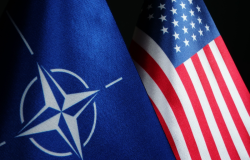Progress and Challenges to Women's Empowerment: Lessons from Tunisia
Nabiha Gueddana, President and Director-General, National Agency for Family and Population, former Secretary of State in charge of Women and Family Affairs and former chair of "Partners in Population and Development: South-South Initiative"
Overview
Nabiha Gueddana noted that the topic of women's rights remains one of the most difficult issues to address in the Middle East. Progress of women's empowerment in Tunisia can serve as a model for the region, according to women's rights advocate, Gueddana. She explained in her presentation that there is much the Arab and Islamic worlds can learn from her native Tunisia regarding the positive effects of empowering women. Within a human rights context, Gueddana provided an overview of how women in Tunisia have been empowered politically, economically, and socially, and how this empowerment has benefited Tunisian society.
On September 8, 2010 the Middle East Program of the Woodrow Wilson Center hosted a discussion with Professor Gueddana, current President and Director-General of the National Agency for Family and Population and candidate for Under-Secretary-General of UN Women at the United Nations. Haleh Esfandiari, Director of the Middle East Program at the Woodrow Wilson Center, moderated the event.
Gueddana began her presentation by describing the impressive changes that Tunisia has undergone since achieving independence from France in 1956. She illustrated the second-class status experienced by Tunisian women in the years prior, describing it as one that relegated them to a life of constant child-rearing, illiteracy, and economic dependence. Gueddana noted that Tunisia is a beacon for other Muslim societies: the country's labor code allows full female participation in the economy; and education is open equally to both boys and girls. Family planning programs and important strides in health have considerably lowered the birth rate and lengthened the life expectancy of the average woman. Gueddana noted, Tunisia's economic growth is now five times greater than the growth rate of its population.
Measures to empower women in Tunisia have benefited not only women but Tunisian society as well, with significant shifts in men's attitudes regarding women's rights and roles in society. In addition to discussing Tunisian women, Gueddana indicated that her efforts include empowering women throughout the world and stated that such efforts will persist so long as women anywhere find themselves disadvantaged, dependent, and living as second-class citizens.
Going forward, Gueddana highlighted two critical areas across all countries: combating violence against women, and promoting women's economic opportunities. Regarding the former, violence against women, particularly sexual violence, is a widespread phenomenon across all societies and, unfortunately, considered often a taboo for discussion. In armed conflicts, for instance, violence against women is still used a tool of warfare. Women's empowerment in society rests increasingly not in the political but in the economic and business domains. While women have made considerable progress in the political arena, the economic power is still a male domain in all countries.
In her remarks, Gueddana emphasized that the discussion of women's rights should take place within the broader context of human rights. They should not be seen as a zero-sum-game between male and female rights, but that everyone gains when all citizens have equal rights and can use them to expand their opportunities and achievements to benefit their societies. She mentioned her desire is to strengthen women's rights—particularly their right to choose independently. To this end, if she is selected as the Under-Secretary-General of UN Women, she would like to work closely with governments and civil society to generate a new agenda and commitment to advance women's status and empowerment.
By Luke Hagberg, Middle East Program
Haleh Esfandiari, Middle East Program
Hosted By

Middle East Program
The Wilson Center’s Middle East Program serves as a crucial resource for the policymaking community and beyond, providing analyses and research that helps inform US foreign policymaking, stimulates public debate, and expands knowledge about issues in the wider Middle East and North Africa (MENA) region. Read more
Thank you for your interest in this event. Please send any feedback or questions to our Events staff.










